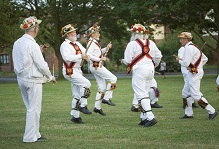English Language 101

The source of it all – the mother of American, Australian, Kiwi and other varieties of English
The history of the English language goes back over 1,500 years, and can basically be traced back to the Indo-European language which was being spoken in various parts of the world up to 3,000 years ago – and from there on developed regional dialects that over time changed to much that they turned into their own languages. The common root of various languages is the reason why some languages have words that sound very similar to each other, e.g. you have “water” in English, and “Wasser” in German.

Ancient Welsh inscription on a tomb in St Garmons Church in Llanarmon-Yn-Ial, Denbighshire, Wales.
Basically, you can divide the history of “English” English into three main periods (that can then be divided into even smaller chunks, but we leave that to the people who actually study linguistics).
- Old English (from 450 to 1100 AD)
- Middle English (from 1100 AD to 1500 AD)
- Modern English (from 1500 AD to today)

Of course, when England had its British Empire, the English language went with them wherever they went. So it is not a surprise that English is a language you can find in many countries of the world. Many countries have English as official first language, and many other countries make their students learn English as their first foreign language. However, English these days is not necessarily all the same. You have different regional dialects (just going from England to Scotland might pose a challenge for some non-native speakers), and even different meanings for the same word in different countries (this is the reason why many non-natives have to read lists that show the difference between American and British English).
Funny English language
English can be a quite funny language sometimes – or maybe it would be better to call it odd and strange. It does not always make sense, and while native speakers simply take the oddities of the English language for granted (after all they are used to it and grew up with it), non-native speakers sometimes find a few things rather bewildering. Here are some examples – did you ever think about them?
- Do a “fat chance” and a “slim chance” mean two different things? No, they do not. Both say that you have not a good chance at all, even though you might think that there should be a difference.
- The word up has so many different meanings, it can be quite confusing! You lock something up, you look something up but you also open something up, you go up. You wake up. A topic comes up. You warm up the leftovers. You make something up. You polish something up. You think up excuses. You are mixed up about something. You don't give up. You wind up with possibilities. You need to shut up and wind up. And those are just a few ways to use a little two letter word!
- There is no egg in an eggplant and no ham in a hamburger.
- Your nose runs, and your feet smell. Shouldn't it be the other way around?
Typical English sayings - Idioms
Idioms are something that come natural to native speakers. We don't think twice about a hot potato or what it means when someone has to go back to the drawing board. But for non-native speakers, idioms are another things that can be quite confusing. Here are some examples.
- Hot potato: Usually a current topic about which many people talk.
- Couch potato: A lazy person, just spending a lot of time in front of the TV on the couch. Often connected with a rather inactive lifestyle.
- Go back to the drawing board: When something you do does not really work out, and you need to start again with a new plan.
- Barking up the wrong tree: Looking in the wrong direction, blaming the wrong person, looking for answers in the wrong places, etc.
- Glad to see the back of: Happy to see another person leaving.
- Best thing since sliced bread: great innovation
- Don't judge a book by its cover: do not judge something by the way it looks
- Cry over spilled milk: complaining about something that has happened but cannot be changed
- Don't count your chickens before your eggs have hatched: used to warn someone who already looks forward to something that might not actually turn out the way they hope.
- Feeling under the weather: feeling a bit ill.
- Hearing something on the grapevine: you heard a rumor
- Once in a blue moon: it does not happen very often – just like a Blue Moon.
- Your guess is as good as mine: means that neither of us has an idea about something, i.e. your guess could be right, my guess could be right.


_(2).jpg)










